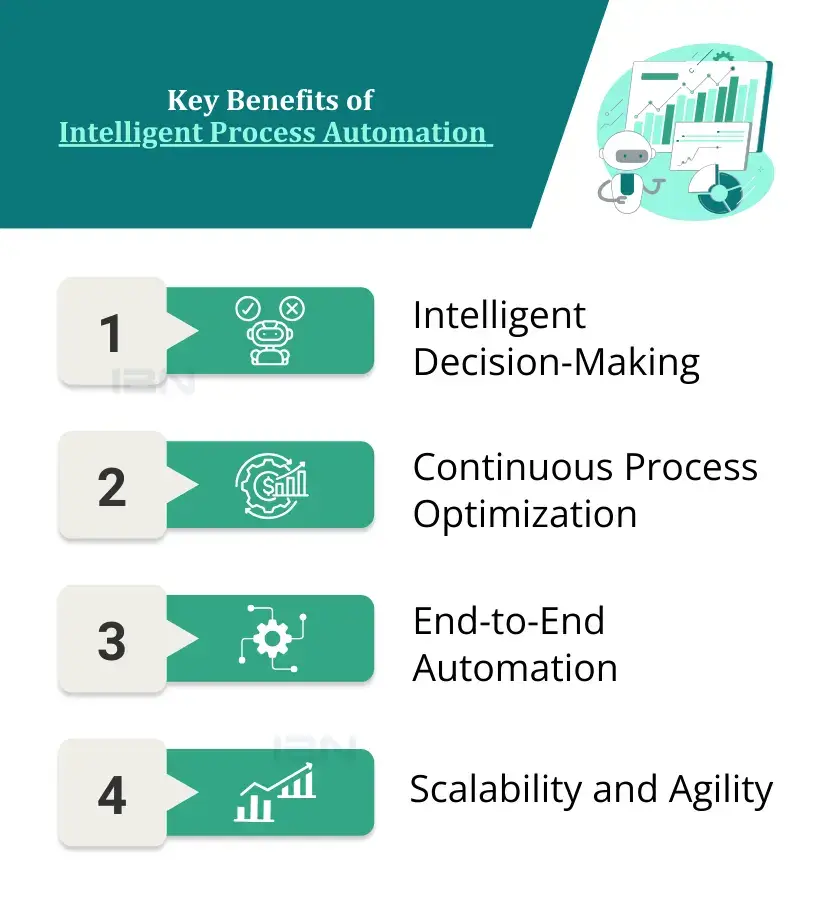The recent SSON event was a hub of innovation, where process automation emerged as a prominent theme. This focus on streamlining workflows resonated deeply with IBN Technologies. Engaging in profound discussions with industry leaders about transforming business processes highlighted the shared interest in creating a more efficient future.
The buzz at the event? Improving efficiency and employee morale. These are precisely the areas where our user-friendly automation solutions excel.
The interest in automation we observed has sparked a flurry of inquiries, signifying its practical impact. Let’s explore how business process automation can refine your operations, empower your employees, and solidify your financial performance.
Table of Contents
- The Value of Intelligent Process Automation
- Key Benefits of IPA
- How IPA Transforms Business Operations
- Practical Applications Across Industries
- IBN Technologies: Your IPA Partner for Operational Excellence
- Process Automation FAQs
The Value of Intelligent Process Automation
Intelligent Process Automation (IPA) elevates traditional automation by integrating Robotic Process Automation (RPA) with Artificial Intelligence (AI) and machine learning. This advanced approach enables systems to make smart decisions using real-time data, transforming business process management into a more dynamic and intelligent operation. IPA is the next level up from traditional automation. It’s like giving automation a brain! Here’s the breakdown:
Traditional Automation
- Follows a predetermined set of instructions perfectly
- Efficient but inflexible
- Cannot handle deviations or make context-based decisions
- Example: A robot copying and pasting data between spreadsheets
Intelligent Process Automation (IPA)
- Combines Robotic Process Automation (RPA) with Artificial Intelligence (AI) and Machine Learning
- Data-driven decisions that can be learnt, adapted, and made intelligently
- Handles a wide range of tasks, including complex processes
- Seamlessly integrates with existing systems and applications
Key Benefits of IPA
1) Intelligent Decision-Making
- Leverages AI to analyze patterns, recognize anomalies, and make informed choices
- Adapts to changing conditions and makes context-based decisions.
2) Continuous Process Optimization
- Identifies inefficiencies and optimizes operations based on data-driven insights
- Learns and improves over time, driving operational excellence.

3) End-to-End Automation
- Facilitates seamless automation across different platforms and technologies
- Enables streamlined and efficient execution of complex processes.
4) Scalability and Agility
- It can easily be scaled up or down based on changing business needs
- Allows organizations to respond quickly to market demands or fluctuations in workload.
IPA leverages a blend of cutting-edge technologies to unlock numerous benefits in process automation. Here’s a simplified breakdown of some key players:
- Robotic Process Automation (RPA) automates repetitive tasks, freeing up human resources for more complex endeavors.
- Optical Character Recognition (OCR) and Intelligent Character Recognition (ICR) extract data from unstructured sources like images and documents.
- Machine Learning algorithms enable systems to learn from data patterns and continuously improve decision-making processes.
- Cognitive AI simulates human thinking, aiding in the management of complex decisions and interactions within processes.
- State-Based Processors and Integration Platforms as a Service (iPaaS) manage data states and integrate diverse applications and data sources.
- Web APIs facilitate connectivity and data flow between different software tools, enhancing system integrations.
How IPA Transforms Business Operations
Intelligent Process Automation (IPA) technologies drive significant improvements across various areas of business operations, empowering organizations to streamline processes, enhance efficiency, and gain a competitive edge. Here’s how IPA contributes to operational excellence:
1. Data Extraction and Validation:
IPA automates the extraction of relevant data from various sources, such as documents, images, and databases, ensuring accurate and reliable information input.
By validating extracted data against predefined rules and parameters, IPA minimizes errors and inconsistencies, improving data quality and integrity.
2 . Intelligent Decision-Making:
Leveraging business rules and AI capabilities, IPA can make or suggest decisions that would typically require human intervention, accelerating process cycles and reducing manual oversight.
This intelligent decision-making capability streamlines operations, enhances responsiveness, and improves overall efficiency.
3 . Scalability and Flexibility:
IPA platforms are designed to scale according to business needs, accommodating fluctuations in workload or operational demands without incurring significant additional costs.
This scalability and flexibility enable organizations to adapt to changing market conditions and evolving requirements seamlessly.
4. Cost Reduction:
By automating routine and complex tasks, IPA minimizes the need for manual labor, allowing organizations to reduce operational costs and redirect resources toward more strategic and value-adding activities.
This cost optimization not only improves profitability but also enhances overall operational efficiency.
5. Enhanced Accurcy:
IPA leverages machine learning and cognitive AI capabilities to reduce errors in data handling and decision-making processes, improving the overall quality and consistency of operations.
By minimizing human errors, IPA contributes to higher accuracy and reliability, ultimately enhancing customer satisfaction and trust.
6. Transparency and Control:
- Advanced analytics and reporting tools integrated into IPA platforms provide organizations with greater insights into their operations, enabling better monitoring, control, and optimization of processes.
- This transparency empowers businesses to identify bottlenecks, make data-driven decisions, and continuously improve their operational performance.
By harnessing the power of IPA technologies, organizations can streamline their operations, drive efficiency, reduce costs, and gain a competitive advantage in their respective industries. IPA not only automates tasks but also infuses intelligence into processes, enabling organizations to unlock new levels of operational excellence and business success.
Practical Applications Across Industries
Organizations across industries find diverse applications for IPA, leveraging its capabilities to enhance various functions: IPA has versatile applications across multiple sectors:
- Finance: Streamlines processes like invoice processing and financial audits.
- Human Resources: Enhances employee onboarding and manages benefits seamlessly.
- Customer Service: Boosts response efficiency and personalizes customer interactions.
- Supply Chain Management: Automates order processing and logistical operations, paving the way for a smoother supply chain.
The integration of IPA into your business can revolutionize not just how tasks are completed, but also how they are managed and optimized, leading to a more agile and responsive business. Let’s embrace this transformative journey together and unlock the full potential of your operations with intelligent process automation.
IBN Technologies: Your IPA Partner for Operational Excellence
At IBN Technologies, we offer more than just automation solutions. We are your trusted advisors, committed to guiding you along the path to operational excellence. Our services extend to a comprehensive range of outsourced accounting, including Accounts Payable and Receivable Management and AP Invoice Processing. By integrating traditional finance functions with the latest in intelligent process automation technologies, IBN Technologies demonstrates an unwavering commitment to optimizing accuracy, efficiency, and compliance in financial operations.
What sets us apart?
- We get you: Every business is unique. We start by understanding your specific challenges and goals through in-depth consultations.
- We craft, not copy: Forget generic solutions. We design a custom IPA strategy that seamlessly integrates with your existing systems, maximizing efficiency from day one.
- We empower, not replace: Our user-friendly automation frees your team from repetitive tasks, allowing them to focus on their strengths and unlock their full potential.
Don’t just dream of a more streamlined future, make it a reality. Contact IBN Technologies today. Let’s discuss how IPA can transform your operations and propel your business forward.
Read More :-Invoice Reconciliation: A Crucial Step in Business Operations
Process Automation FAQs
- Q.1 What is process automation AI?
- Process automation AI refers to the use of artificial intelligence technologies to automate complex tasks that involve decision-making, pattern recognition, and learning from data.
- Q.2 What is the difference between RPA and intelligent process automation?
- RPA automates simple, rule-based tasks, while intelligent process automation (IPA) combines RPA with AI to handle more complex, decision-based processes.
- Q.3 What are the three ways to automate a process?
- 1) RPA (Robotic Process Automation): Automates routine, rule-based tasks.
2) Workflow Automation: Streamlines business processes by automating task flows and approvals.
3) AI-based Automation: Uses AI and machine learning to automate tasks that require decision-making and data analysis.


